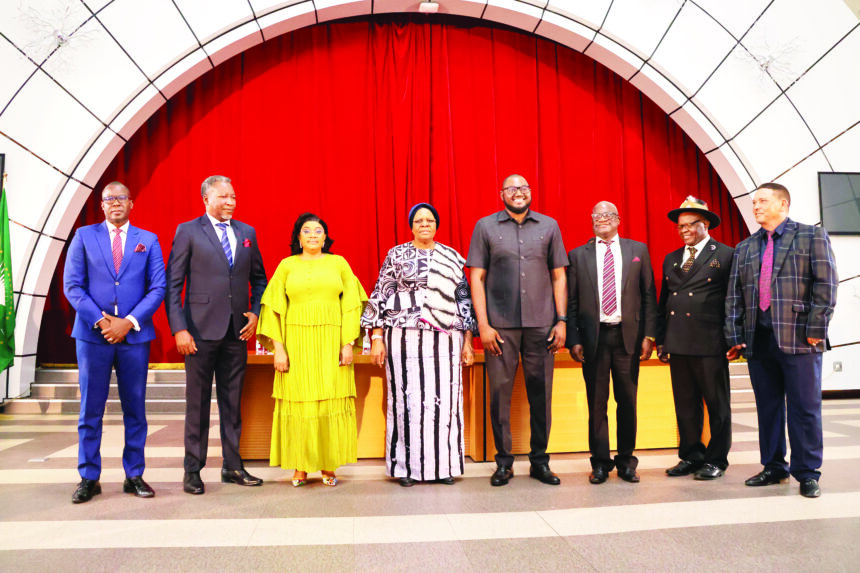President Netumbo Nandi-Ndaitwah has urged the newly-appointed regional governors to prioritise service delivery and accountability as inefficiency, corruption or negligence would not be tolerated.
Speaking during the announcement of new governors at State House on Friday, the president said they must be proactive in fighting issues of great concern that affect Namibians at regional level.
President Nandi-Ndaitwah appointed seven new regional governors for the Khomas, Kunene, Oshikoto, Kavango West, Kavango East, Hardap and Otjozondjupa regions. The new governors include Sam Shafiishuna Nujoma for Khomas, replacing former governor Laura McLeod-Katjirua.
Nujoma previously served the City of Windhoek as a Swapo councillor in December 2020, and became council chairperson in 2023.
Vipuakuje Muharukua was appointed governor of Kunene, succeeding Marius Sheya, who is now a Member of Parliament.
Sacky Kathindi takes over as governor of Oshikoto, replacing Penda ya Ndakolo, while Hamunyera Hambyuka has been appointed to oversee Kavango East, suceeding Bonifatius Wakudumo.
In the Kavango West, Verna Sinimbo has suceeded Sirka Hausiku, while Riaan Charles McNab has been appointed governor of Hardap, succeeding Salomon April.
John Julius //Khamuseb has taken over as governor of Otjozondjupa after James Uerikua also secured a seat in the National Assembly.
The fate of the replaced governors remains uncertain, as the presidency has not assigned them new roles.
Meanwhile, the governors of the Omusati, Ohangwena, Oshana, Zambezi, //Kharas, Omaheke and Erongo regions have been retained.
“There shall be no business as usual. Governors must be proactive, collaborate with stakeholders, and ensure that the people’s needs are met without delay. Unethical behaviour and lacklustre implementation of policies will not be accepted”, the President stressed.
“You must be ready to address issues within your scope of responsibilities. Engage your communities, involve local leaders and focus on practical solutions that will uplift our people,” urged Nandi-Ndaitwah.
The president likewise emphasised the importance of maintaining direct and open communication with the President’s Office regarding pressing regional matters.
“Governors must ensure that all urgent concerns, whether related to service delivery, economic challenges or social issues, are promptly brought to my attention. You are my representatives on the ground, and I expect timely updates on issues affecting our citizens,” she stated.
The Head of State further reminded governors that their work will be closely monitored to ensure accountability and effectiveness. “Your performance will be measured by the tangible improvements you bring to your regions. If issues persist without resolution, you will be held accountable.”
Following the president’s remarks, the new governors outlined key priorities for their respective regions.
Priorities
Nujoma expressed appreciation for the confidence placed in him by the president. “I’m overjoyed to be here, and thankful for this opportunity to serve the people of the Khomas region,” he said. While still settling into his new role, he highlighted environmental concerns, land and housing as his primary focus areas.
“Housing remains a major concern, especially in informal settlements. We need to accelerate land servicing, and work with stakeholders to provide affordable housing options. At the same time, we must address environmental issues, ensuring that development is sustainable and benefits all residents.”
Hardap
The new Hardap governor expressed deep gratitude for the trust placed in him by the president. He underscored the importance of unity, urging residents to work together to achieve regional progress. “Unity of purpose is our sharp weapon for success,” he stated.
McNab pledged to prioritise inclusive governance and economic empowerment, particularly for marginalised communities. “We must work together to unlock economic opportunities in agriculture, tourism and manufacturing. Hardap has great potential, and I will ensure government initiatives translate into real benefits for our people.”
Oshikoto region
The governor of Oshikoto acknowledged the challenges ahead, but remained optimistic. “Oshikoto is a vast region with many challenges, but also great potential,” he noted. “As someone who grew up there, I understand the difficulties our communities face.”
Kathindi emphasised the need for a data-driven approach to governance. “Before we implement solutions, we must fully understand the needs on the ground. My first step will be engaging local leaders, businesses and residents to assess our priorities and formulate strategic development plans which address key issues such as infrastructure, education and healthcare.”
Kavango East
The governor of Kavango East, a region ranked among the poorest in Namibia, highlighted poverty alleviation as his main priority. “My task is to ensure our people move away from poverty. We cannot continue to rank as one of the most impoverished regions; change must happen,” Hambyuka stressed.
“We must work as a collective, mobilising resources to create jobs, enhance education and improve healthcare. Within a year or two, I expect to see tangible progress in the livelihoods of our people.”
Kavango West
The governor of Kavango West underscored the importance of agriculture in boosting the local economy.
“Our region has a perennial river, fertile land and great potential for agriculture. It is time to harness these resources for economic growth,” she enthused.
She proposed the establishment of agro-processing industries in the region to create jobs and add value to agricultural products.
Hausiku continued: “We must move beyond primary agriculture, and invest in processing facilities which will create employment and promote food security. Additionally, youth empowerment is a key priority — I want to see young people engaged in agribusiness and other economic activities.”
Otjozondjupa region
The governor of Otjozondjupa is focused on industrialisation, value-addition and housing development. “We are in a strategic location that should be a centre for manufacturing and value-addition. If we strengthen our industrial sector, we can create more jobs and contribute significantly to the national economy”, he stated.
//Khamuseb also highlighted the pressing need for proper housing. “Decent housing is a fundamental right. We must address the housing crisis by constructing affordable homes and systematically eliminating informal settlements. By training unemployed youth in construction-related skills, we can build homes and create jobs at the same time.”



